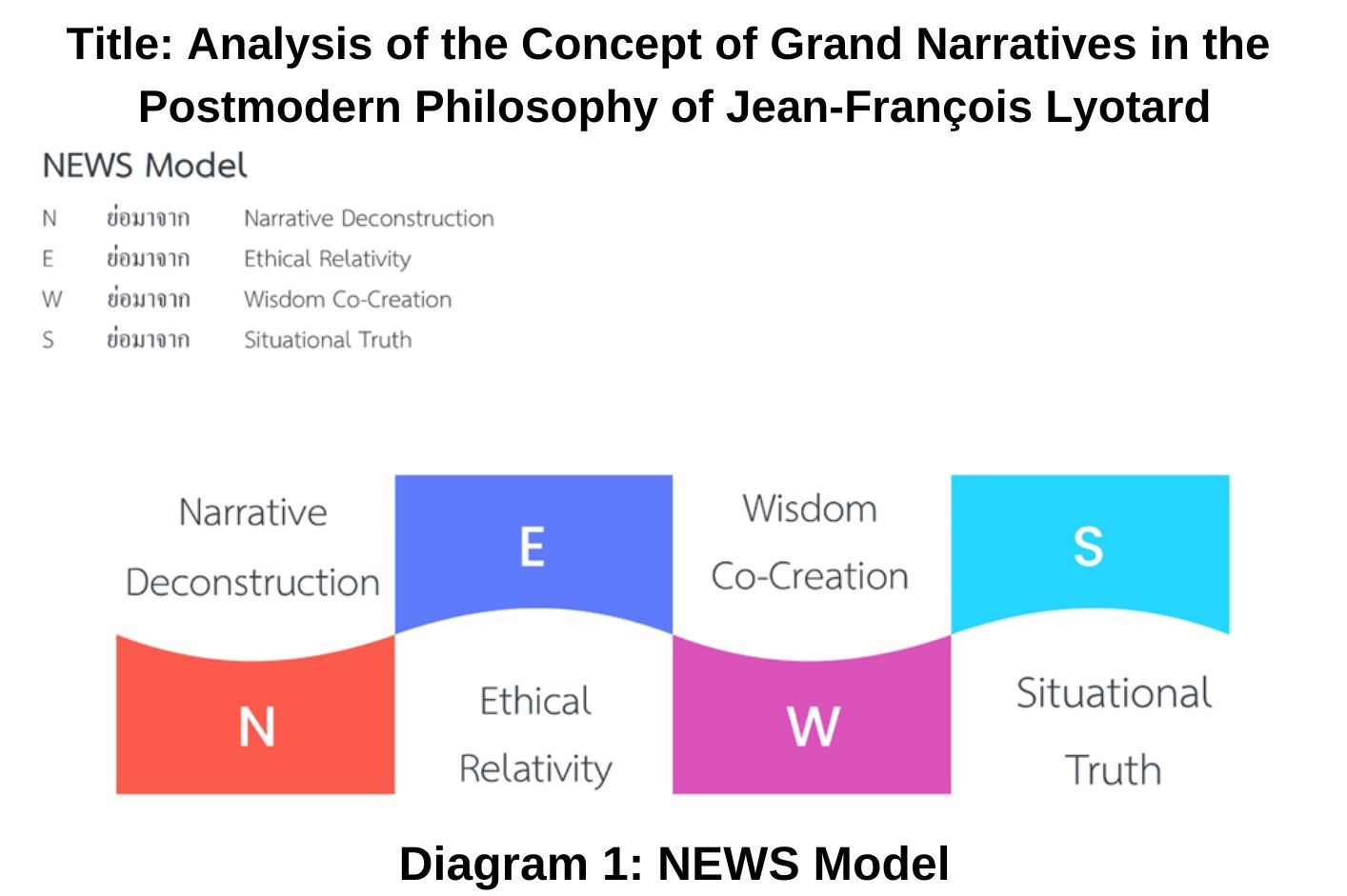Analysis of the Concept of Grand Narratives in the Postmodern Philosophy of Jean-François Lyotard
Keywords:
Grand Narratives, Lyotard, Postmodern PhilosophyAbstract
The purpose of this article was to analyze the concept of Grand Narratives in the postmodern philosophy of Jean-François Lyotard by examining its foundations, significance, and impact on contemporary society. The analysis focused on questioning the universality of Grand Narratives and proposing new practical and philosophical contexts. The research employed qualitative methods, primarily through the analysis of key documents related to Lyotard's ideas. The findings revealed that Grand Narratives were criticized as tools supporting centralized power structures while diminishing societal diversity in perspectives. Replacing Grand Narratives with Petite Narratives fostered a more flexible and decentralized knowledge system, which significantly influenced changes in social structures and communication. Additionally, the analysis demonstrated that Grand Narratives raised global awareness of the importance of cultural diversity and differing viewpoints, contributing to the promotion of equality and justice in society. The reduction of Grand Narrative dominance allowed various communities to generate knowledge and practices tailored to their specific contexts, fostering sustainable and inclusive social development. This awareness was deemed crucial for building a global society that values and respects differences while supporting balanced development at both local and global levels. The new knowledge derived from this research is the NEWS Model, which comprises four key components as follows: N: Narrative Deconstruction, E: Ethical Relativity, W: Wisdom Co-Creation, S: Situational Truth.
References
กันยาวีร์ สัทธาพงษ์. (2562). การประยุกต์ใช้อรรถปริวรรตการตีความปรัชญาของเศรษฐกิจพอเพียงในเรื่องเกษตรทฤษฎีใหม่เพื่อสร้างสมดุลชีวิตอย่างยั่งยืนด้วยมุมมองปรัชญาหลังนวยุค. วารสารเซนต์จอห์น, 22(30), 236-253.
ชิสา กันยาวิริยะ และ สิรินทร์ กันยาวิริยะ. (2567). ผู้นําคุณธรรมตามหลักปรัชญาหลังนวยุคสายกลาง. วารสารสถาบันพอดี, 1(6), 9-18.
ไชยรัตน์ เจริญสินโอฬาร. (2554). แนะนำสกุลความคิดหลังโครงสร้างนิยม. กรุงเทพฯ : สมมติ.
นฤพนธ์ ด้วงวิเศษ. (2566). ฟรองซัวส์ ลีโยตาร์ด และการต่อต้านมนุษยนิยม Jean-François Lyotard and Antihumanism. กรุงเทพฯ : ศูนย์มานุษยวิทยาสิรินธร.
พระครูโอภาสสราธิคุณ (ชาตรี อาสโภ). (2564).พุทธธรรมาภิบาลกับปรัชญาหลังนวยุคสายกลาง. วารสารสันติศึกษาปริทรรศน์ มจร, 9(4), 1444-1454.
เมธา หริมเทพาธิป. (2561). การมีส่วนร่วมในมุมมองหลังนวยุค. รมยสาร, 16(3), 63-77.
ไมสิง จันบุดดี. (2559). อนุสาวรีย์: ภาพสะท้อนด้านอัตลักษณ์ ประวัติศาสตร์ การเมือง และ ความสัมพันธ์ในสาธารณรัฐประชาธิปไตย ประชาชนลาว. วิทยานิพนธ์ปริญญาปรัชญาดุษฎีบัณฑิต. ขอนแก่น : มหาวิทยาลัยขอนแก่น.
ศุภฤกษ์ คณิตวรานันท์. (2562). ฌอง ฟรองซัวส์ ลีโยตาร์ด : ความงามที่แตกต่างในศิลปะร่วมสมัย. นนทบุรี : นิติธรรมการพิมพ์.
สมปอง มูลมณี. (2561). ตำนานประจำถิ่นทุ่งกุลาร้องไห้: เรื่องเล่าเชิงนิเวศกับการต่อสู้และ ต่อรองทางสังคมและวัฒนธรรม. วารสารคณะมนุษยศาสตร์สังคมศาสตร์ (มมส), 16(2), 69-92.
สิรินทร์ กันยาวิริยะ และ ชิสา กันยาวิริยะ.(2567). การบริหารแบบมีส่วนร่วมตามหลักปรัชญาหลังนวยุคสายกลาง. วารสารสถาบันพอดี, 1(7), 27-40.
อรรถจักร์ สัตยานุรักษ์. (2559). ความหวาดระแวงต่อพื้นที่ทางสังคม. กรุงเทพฯ : มติชน.
Boyle, N. (1998). Who are We Now? Christian Humanism and the Global Market from Hegel to Heaney. Notre Dame, IN : University of Notre Dame Press.
Lyotard, J. F. (1984).The Postmodern Condition: A Report on Knowledge.Bennington, G. and Massumi, B. (trans.).Minneapolis : The University of Minnesota Press.
Lyotard, Jean-Francois. (1984). The Postmodern Condition : A Report on Knowledge. Minneapolis : University of Minnesota Press.
Sim, S. (2001). The Routledge Companion to Postmodernism. London : Routledge.

Downloads
Published
How to Cite
Issue
Section
License
Copyright (c) 2025 Institute of Sufficiency Journal

This work is licensed under a Creative Commons Attribution-NonCommercial-NoDerivatives 4.0 International License.



